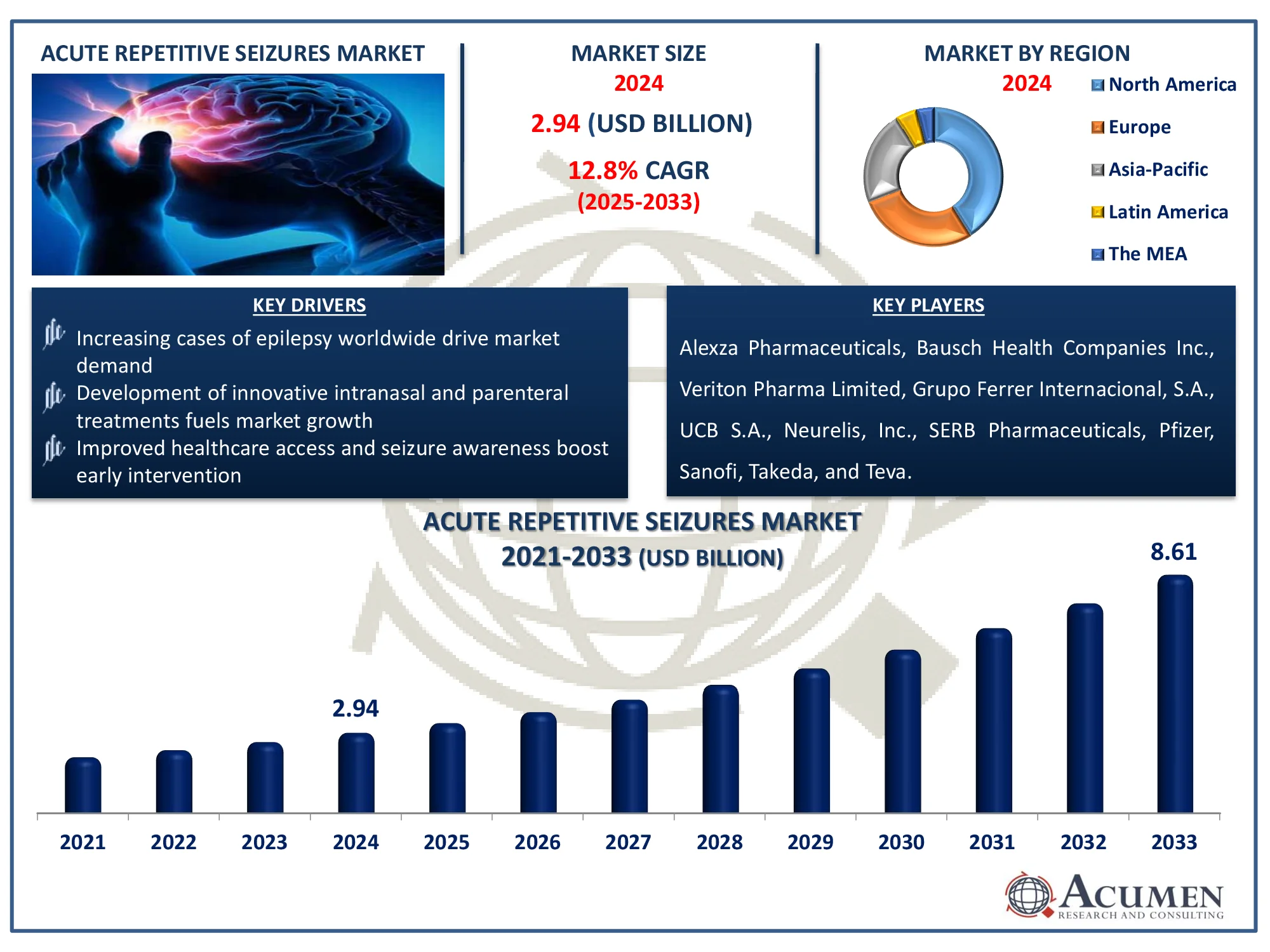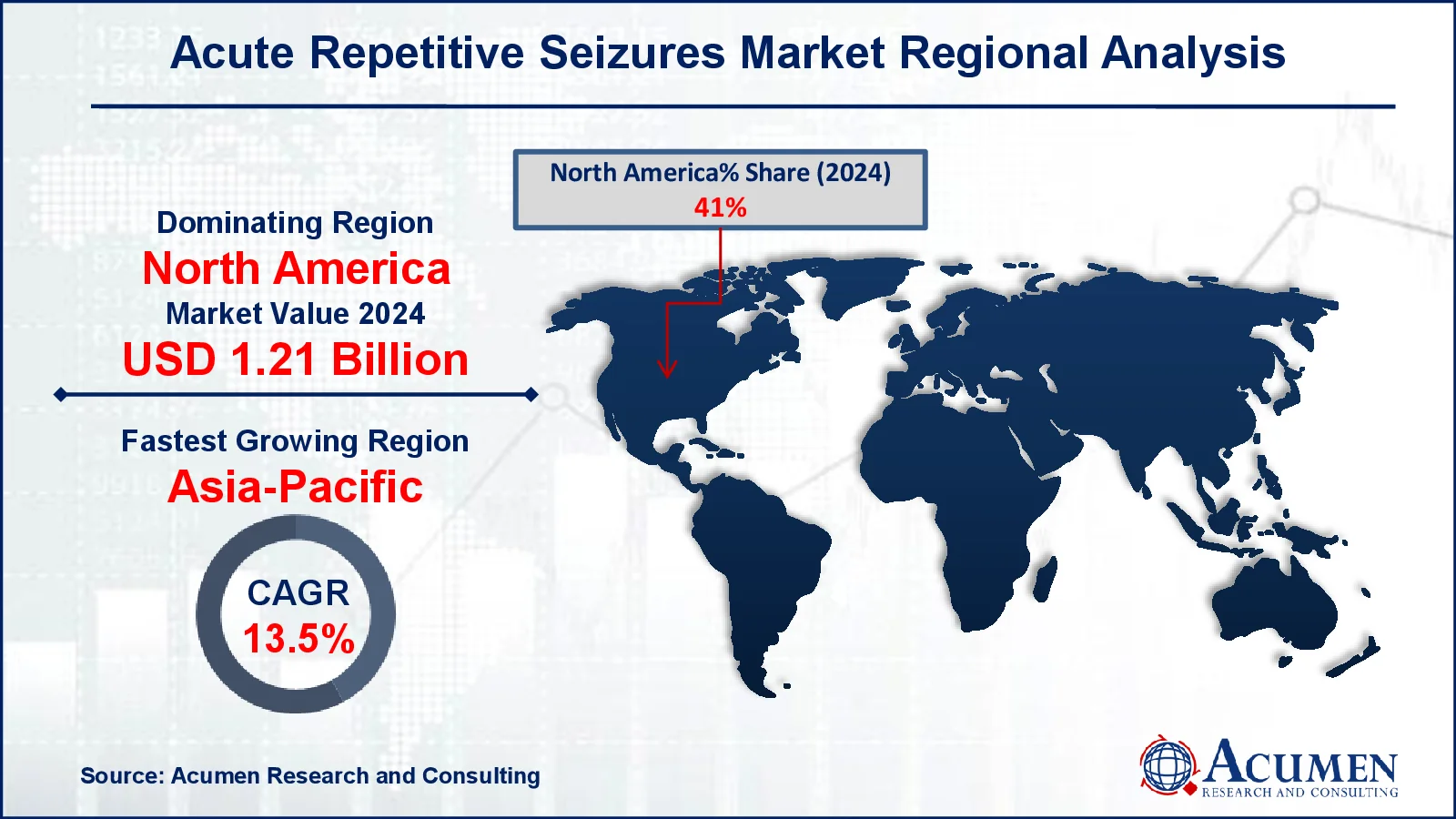Acute Repetitive Seizures Market Size - Global Industry, Share, Analysis, Trends and Forecast 2025 - 2033
Published :
Report ID:
Pages :
Format :
Acute Repetitive Seizures Market Size - Global Industry, Share, Analysis, Trends and Forecast 2025 - 2033
Report Coverage
- Industry Dynamics
- Market Size and Forecast Data
- Segment Analysis
- Competitive Landscape
- Regional Analysis with a Niche Focus on Country-Level Data
- High Level Analysis - Porter's, PESTEL, Value Chain, etc.
- Company Profiles of Key Players
- Option to Customize the Report As Per Your Specific Need
Request Sample Report
The Global Acute Repetitive Seizures Market Size accounted for USD 2.94 Billion in 2024 and is estimated to achieve a market size of USD 8.61 Billion by 2033 growing at a CAGR of 12.8% from 2025 to 2033.
Acute Repetitive Seizures Market Highlights
- The global acute repetitive seizures market is projected to reach USD 8.61 billion by 2033, growing at a CAGR of 12.8% from 2025 to 2033
- A recent Global Burden of Disease (GBD) study predicts that the number of individuals affected by brain diseases will double by 2050
- In 2024, the North American acute repetitive seizures market was valued at approximately USD 1.21 billion
- The Asia-Pacific acute repetitive seizures market is expected to grow at a CAGR exceeding 13.5% from 2025 to 2033
- Within the product segment, the USL-261 sub-segment accounted for 44% of the market share in 2024
- Integration of wearable devices and AI-driven diagnostics for real-time seizure monitoring and personalized treatment is a popular market trend that fuels the industry demand

Acute repetitive seizures (ARS) are also known as recurring, serial, or cluster seizures. It is a syndrome in treatment-resistant epilepsy characterized by a close chronological relationship of seizures that exceed a patient's expected baseline seizure incidence. ARS increases the likelihood of hospitalization and/or progression to status epilepticus, a life-threatening seizure emergency, highlighting the importance of early, effective management. Benzodiazepines are mainly used as needed for rescue treatment in this orphan indication. They are prescribed adjunctively to patients' chronic antiepileptic medication (AED) regimen and provided on an as-needed basis.
Global Acute Repetitive Seizures Market Dynamics
Market Drivers
- Increasing cases of epilepsy worldwide drive market demand
- Development of innovative intranasal and parenteral treatments fuels market growth
- Improved healthcare access and seizure awareness boost early intervention
Market Restraints
- Expensive medications and hospital care limit patient access
- Stringent approval processes delay drug launches
- Inadequate healthcare infrastructure hampers market expansion
Market Opportunities
- Pipeline drugs promise improved efficacy and convenience
- Increasing healthcare investments create new growth avenues
- Wearable devices and AI-driven diagnostics enhance patient care
Acute Repetitive Seizures Market Report Coverage
|
Market |
Acute Repetitive Seizures Market |
|
Acute Repetitive Seizures Market Size 2024 |
USD 2.94 Billion |
|
Acute Repetitive Seizures Market Forecast 2033 |
USD 8.61 Billion |
|
Acute Repetitive Seizures Market CAGR During 2025 - 2033 |
12.8% |
|
Acute Repetitive Seizures Market Analysis Period |
2021 - 2033 |
|
Acute Repetitive Seizures Market Base Year |
2024 |
|
Acute Repetitive Seizures Market Forecast Data |
2025 - 2033 |
|
Segments Covered |
By Product, By Route Of Administration, By Distribution Channel, and By Geography |
|
Regional Scope |
North America, Europe, Asia Pacific, Latin America, and Middle East & Africa |
|
Key Companies Profiled Aviation |
Alexza Pharmaceuticals, UCB S.A., Neurelis, Inc., Bausch Health Companies Inc., Veriton Pharma Limited, Grupo Ferrer Internacional, S.A., Pfizer, Sanofi, Takeda Pharmaceutical Company Limited, Teva Pharmaceutical Industries, and SERB Pharmaceuticals. |
|
Report Coverage |
Market Trends, Drivers, Restraints, Competitive Analysis, Player Profiling, Covid-19 Analysis, Regulation Analysis |
Acute Repetitive Seizures Market Insights
Several major drivers drive the global acute repeated seizures market, including the discovery of new methods of administration for epileptic seizures, advances in pharmaceutical therapy, and the impact of inherited variables associated with brain abnormalities and epilepsy. Furthermore, enormous unmet clinical requirements among patients and caregivers, together with a robust pipeline of novel treatments, are projected to fuel market expansion in the future years.
The market future remains quite positive, thanks to the growing prevalence of neurological illnesses, a strong pipeline of possible medicines, and an increasing number of regulatory approvals. According to the World Federation of Neurology (October 16, 2023), neurological illnesses are currently the second leading cause of death and the top cause of disability globally. Furthermore, data from the Institute for Health Metrics and Evaluation (IHME) reveals that in 2021, neurological diseases afflicted nearly 3.4 billion individuals (43% of the global population), indicating a substantially larger burden than previously believed.
Furthermore, increased investment in research and development (R&D) is likely to generate new growth prospects. Several significant branded medications are now in the pipeline and are expected to hit the market soon, backed by robust R&D initiatives. Notably, the switch from rectal to nasal delivery is expected to create new opportunities for market growth.
However, lack of awareness remains a significant concern, particularly in Asia-Pacific countries like India. Limited access to competent healthcare services, a scarcity of affordable therapies and specialist care, and geographic limitations to healthcare facilities all exacerbate the problem. Furthermore, a lack of understanding of new treatment options for neurological illnesses limits market penetration in these locations.
On the other hand, increased demand for safer and more cost-effective options has fuelled clinical research into the safety and efficacy of nasal route administration, notably nasal sprays. This move is expected to stimulate additional breakthroughs in seizure management and increase treatment accessibility.
 Acute Repetitive Seizures Market Segmentation
Acute Repetitive Seizures Market Segmentation
The worldwide market for acute repetitive seizures is split based on product, route of administration, distribution channel, and geography.
Acute Repetitive Seizures Market By Product
- USL-261
- NRL-1
- Diastat Rectal Gel
- AZ-002
- Others
According to acute repetitive seizures industry analysis, USL-261, a nasally given midazolam formulation, is a market leader in acute repeated seizures due to its quick start of action and convenience of administration. Its non-invasive delivery approach increases patient compliance, making it a better choice than standard injectable therapy. Clinical investigations have shown that it is effective in swiftly reducing seizure clusters, cementing its market leadership. Furthermore, governmental approvals and rising use by healthcare providers contribute to its significant market presence and growth. The diastat rectal gel category has the potential for significant growth in the business. This increase is attributed to its competence and the scarcity of FDA-approved drugs on the market. Patients prefer the intra-nasal approach over other methods of pharmacological administration such as buccal, rectal, and intramuscular. Parenteral medications have been shown to be the most effective alternative for outpatient therapy.
Acute Repetitive Seizures Market By Route of Administration
- Oral
- Rectal
- Intranasal
- Other
According to acute repetitive seizures industry analysis, intranasal method dominates the market due to its quick drug absorption, convenience of administration, and non-invasiveness. It enables fast seizure control, making it ideal for emergency use, especially in out-of-hospital situations. Products such as USL-261 (midazolam nasal spray) have achieved substantial momentum, accelerating market expansion. Oral and rectal methods are also used, although they have drawbacks such as delayed start (oral) and inconvenience (rectal), making them less attractive for acute seizure control.
Acute Repetitive Seizures Market By Distribution Channel
- Hospital Pharmacies
- Retail Pharmacies
- Online Pharmacies
According to acute repetitive seizures market forecast, hospital pharmacy dominate because they provide the majority of emergency and specialty neurological treatments. They ensure the prompt availability of important seizure drugs, particularly for inpatient care and emergency situations. Furthermore, robust hospital networks and physician prescriptions boost up sales in this channel. Retail pharmacies are an important distribution channel for outpatient prescriptions, providing access to long-term drug management. Online pharmacies are gaining appeal due to convenience and home delivery alternatives. However, regulatory obstacles and prescription restrictions prevent their widespread usage.
Acute Repetitive Seizures Market Regional Outlook
North America
- U.S.
- Canada
Europe
- U.K.
- Germany
- France
- Spain
- Rest of Europe
Asia-Pacific
- India
- Japan
- China
- Australia
- South Korea
- Rest of Asia-Pacific
Latin America
- Brazil
- Mexico
- Rest of LATAM
The Middle East & Africa
- South Africa
- GCC Countries
- Rest of the Middle East & Africa (ME&A)
 Acute Repetitive Seizures Market Regional Analysis
Acute Repetitive Seizures Market Regional Analysis
In terms of regional segments, North America emerged as the largest market for acute repeated seizures in 2024, with a high revenue share. The large target market for epilepsy medications is driving this growth in the United States and Canada. For example, in December 2024, Neurelis, Inc. presented findings at the American Epilepsy Society Annual Meeting, which included 10 papers on immediate-use seizure medicine for seizure clusters, as well as studies of VALTOCO and its wider implications. This has driven market growth by increasing adoption and investment in immediate-use seizure therapies.
According to market projections, the Asia-Pacific area will enjoy significant growth during the forecast period, mostly due to increased healthcare expenditures. According to the Press Information Bureau, the Economic Survey underlines India's tremendous potential for implementing Artificial Intelligence in healthcare. In 2023, 34% of Indian healthcare businesses were piloting AI projects, and 16% had put their generative AI ventures into production. This is hastening the growth of the acute repeated seizures market by allowing AI-driven advances in diagnosis and treatment, which will ultimately improve patient outcomes and adoption rates. Additionally, there is a major treatment gap for acute repeated seizures in this region. As a result, the rising demand for anti-seizure pharmaceuticals in emerging countries is likely to boost the expansion.
Acute Repetitive Seizures Market Players
Some of the top acute repetitive seizures companies offered in our report include Alexza Pharmaceuticals, UCB S.A., Neurelis, Inc., Bausch Health Companies Inc., Veriton Pharma Limited, Grupo Ferrer Internacional, S.A., Pfizer, Sanofi, Takeda Pharmaceutical Company Limited, Teva Pharmaceutical Industries, and SERB Pharmaceuticals.
Frequently Asked Questions
What was the market size of the global Acute Repetitive Seizures in 2024?
The market size of acute repetitive seizures was USD 2.94 Billion in 2024.
What is the CAGR of the global Acute Repetitive Seizures market from 2025 to 2033?
The CAGR of acute repetitive seizures is 12.8% during the analysis period of 2025 to 2033.
Which are the key players in the Acute Repetitive Seizures market?
The key players operating in the global market are including Alexza Pharmaceuticals, UCB S.A., Neurelis, Inc., Bausch Health Companies Inc., Veriton Pharma Limited, Grupo Ferrer Internacional, S.A., Pfizer, Sanofi, Takeda Pharmaceutical Company Limited, Teva Pharmaceutical Industries, and SERB Pharmaceuticals.
Which region dominated the global Acute Repetitive Seizures market share?
North America held the dominating position in acute repetitive seizures industry during the analysis period of 2025 to 2033.
Which region registered fastest CAGR from 2025 to 2033?
Asia-Pacific region exhibited fastest growing CAGR for market of acute repetitive seizures during the analysis period of 2025 to 2033.
What are the current trends and dynamics in the global Acute Repetitive Seizures industry?
The current trends and dynamics in the acute repetitive seizures industry include increasing cases of epilepsy worldwide drive market demand, development of innovative intranasal and parenteral treatments fuels market growth, and improved healthcare access and seizure awareness boost early intervention.
Which Product held the maximum share in 2024?
The USL-261 held the maximum share of the acute repetitive seizures industry.


